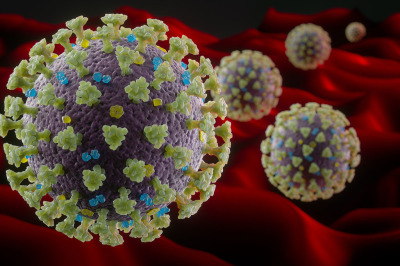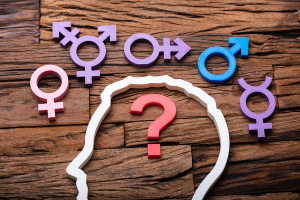Did God make the coronavirus? Three questions to consider

As Tony Stark (a.k.a. Iron Man) said to the alien invaders near the beginning of Marvel’s “Avengers: Infinity War,” “The earth is closed today!” The world continues to respond to the current novel coronavirus pandemic by closing everything from churches, to restaurants, to movie theaters and many other public spaces in order to limit person-to-person interaction. While my own family practiced “social distancing” this past Sunday by watching a livestream of our pastor, we reflected on current events and the changes we are all making. We talked about having peace in the midst of trouble and the fact that God is still in control. Then my oldest son made an interesting comment. He said, “God made the coronavirus.”
This makes perfect sense to 9-, 6- and 3-year-old boys, my sons’ ages, who have a simple belief that God made everything. The coronavirus is a thing. Therefore, God must have made the coronavirus, right? Well, the answer is both yes and no. There are at least three things to consider when wrestling with this question.
1. Why Does Anything Exist?
As we have argued in many places like Southern Evangelical Seminary’s e-book, Why Trust the God of the Bible?, nothing at all would exist apart from the creative and sustaining power of God. Indeed, God at this moment holds in being the novel coronavirus, along with everything else that exists. Were this not the case, nothing at all other than God would “be.”
That is not to say, however, that everything that exists here and now is a special creation of God out of nothing. A piece of blue chalk causes a blue line on the chalkboard, but the chalk could do nothing apart from the hand holding it. The chalk is only an instrumental cause. In a similar fashion, God acts through secondary, or instrumental, causes in this world. As Thomas Aquinas puts it:
“Nor is it superfluous, if God can produce all natural effects by Himself, that they should be produced by certain other causes: because this is not owing to insufficiency of His power, but to the immensity of His goodness, wherefore it was His will to communicate His likeness to things not only in the point of their being but also in the point of their being causes of other things: for it is in these two ways that all creatures in common have the divine likeness bestowed on them, as we proved above.—In this way too the beauty of order is made evident in creatures.”
Assuming the novel coronavirus is a naturally occurring virus, God created the original virus(es) and animal kingdom that eventually provided the needed conditions for the novel coronavirus to emerge. Much like tornados, hurricanes, lightning and even other disease-causing agents, the novel coronavirus is a byproduct of the good world God created. How can this virus be part of a good world?
2. What Do We Mean By ‘Good’?
In the creation account of Genesis, we read that God called everything He made “good.” Does that include things like viruses? Classically speaking, good is a matter of actuality or being. Something is good to the extent that it exists as the kind of thing it ought to be according to its nature. Understood in this way, everything that exists is good in one respect just by virtue of the fact that it exists. Things are good instances of their kinds when they exist and fulfill the ends toward which their natures are directed. Even a virus, by virtue of existing, is good. Moreover, a virus that finds a host and replicates itself is a good virus. That is, it is fulfilling the end toward which it is directed. Notice that “good” means more than just “morally good.” (Moral goodness is a subset of good as such and is not our current topic).
Evil, on the other hand, is to be understood as a privation. That is, it is the lack of some good that should be in a particular thing given that thing’s nature. Evil can also result from something being added to another thing that ought not be part of that thing. For instance, pencils are good and eyes are good, but a pencil in my eye would result in the evil of the loss of sight — sight being the end toward which an eye is directed.
Hence, evil is ultimately parasitic on good. Evil is a lack of being rather than something that itself has being. To again quote Aquinas, “No being can be spoken of as evil, formally as being, but only so far as it lacks being. Thus a man is said to be evil, because he lacks some virtue; and an eye is said to be evil, because it lacks the power to see well.”
There is nothing intrinsically evil about a virus per se. We only call it evil when it infects us and causes a privation (i.e. a lack of health) in our being. This is what Aquinas calls “evil suffered.” But why would God create things like viruses in the first place that cause “evil suffered”?
3. Why Would God Allow ‘Evil Suffered’?
Before addressing that issue, we must consider the first point above. We know from the existence of any part of physical reality that God is Pure Being itself. Recall that good is ultimately a matter of existence. God is Existence itself and causes the existence of all other things. Therefore, God is not a good thing among others but is Goodness itself and the Source of the goodness of all other things.
Given this, it also follows that God’s intellect and will are one and the same with His divine essence. As the source of both the essences (or natures) and existence of all created things, God can only ever create what is good (since evil is a lack of good and not a thing to be created) and will what is good for His creation.
How could it be good for God to create viruses that make people sick? Science is giving us some clues as to the usefulness of viruses on a variety of fronts. But ultimately, we just do not always know. We do know, however, that God exists as Goodness itself, even a virus could not exist without God’s sustaining power, and we can trust that He will bring about good even from the worst evil. God does not will evil for its own sake, but He does permit certain evils to occur. As Aquinas says:
“Hence, corruption and defects in natural things are said to be contrary to some particular nature; yet they are in keeping with the plan of universal nature; inasmuch as the defect in one thing yields to the good of another, or even to the universal good: for the corruption of one is the generation of another, and through this it is that a species is kept in existence. Since God, then, provides universally for all being, it belongs to His providence to permit certain defects in particular effects, that the perfect good of the universe may not be hindered, for if all evil were prevented, much good would be absent from the universe. A lion would cease to live, if there were no slaying of animals; and there would be no patience of martyrs if there were no tyrannical persecution.”
Thus, the Apostle Paul can confidently say that all things work together for good for those that love God and are called according to His purpose (Romans 8:28).
Conclusion
Could God make a world with no evil suffered? It seems He could. But He has not done so. Given our material world of interacting things, lions will eat gazelles, worms will eat apples and people will get sick from viruses. The Garden of Eden and the supernaturally graced state of pre-fall Adam and Eve being exceptions.
The novel coronavirus may mean the earth is closed today, and probably tomorrow as well, but that does not mean our minds and hearts need to be. I will end with these words from philosopher Brian Davies: “According to Aquinas, evil suffered occurs only insofar as there is a concomitant good in the light of which it can be explained. It is, he thinks, due to something that by being good in its way, causes something else to be bad in its way.”
As we face the evil suffered from the novel coronavirus, may we lean into God, Pure Goodness itself, and ask Him to help us be good in the human way by seeking Him first and loving our neighbors as ourselves during their time of need. Let us also remember that God demonstrated His amazing Goodness by dying in our place and ultimately removing the barrier of sin that separates us from Him. That is the greatest good for which we could hope, brought forth from the greatest evil ever perpetrated. For that we shall praise Him!
Adam Tucker is the Director of Recruiting and Admissions at Southern Evangelical Seminary.



























